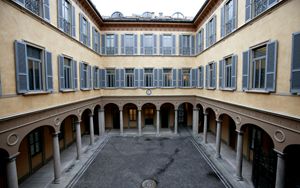(Finance) – Increase the turnover of medium-sized enterprises in 2022 (+15%) and growth prospects continue, albeit more contained, for 2023 (+3.5%).It is the photograph taken by XXII Report on medium-sized Italian industrial enterprises presented today in Milan by the Mediobanca, Unioncamere and Tagliacarne Study Area from which it also emerges that medium-sized companies confirm that they have a dynamic and more resilient model compared to large companies in times of crisis. The key to this success lies in the attention to quality and Human Capital, which represents the determining factor of competitiveness.
The medium-sized companies that invest in digitization and green are more optimistic. 34% of those expecting revenue growth in the 2023-2025 period will in fact focus on the Dual Transition, against 30% who will not. A share that rises to 46% when investments in digital and green are combined with those in the formation of human capital. From this point of view, about half of the companies has activated or intends to activate itself on the programs of the PNRR, but bureaucracy is the main obstacle for the other half who do not plan to make use of the Plan.
“Medium-sized enterprises are proving to be more competitive than other entrepreneurial realities, also because they are more aware of the need to accompany their innovation path with the training of human capital used to make the most of the development opportunities offered by the digital and green dual transition”. The President of Unioncamere said it, Andrew Priest, who added “focusing on training is also strategic to respond to the growing difficulty of finding professional figures with the right skills that affects almost half of searches and to break down those cultural barriers that today risk holding back investments in the Twin Transition. But for this it is also essential to streamline the bureaucracy that holds back a large number of companies from exploiting the advantages of the PNRR to finance their own path of change. From this point of view, the legislative decree on simplification that has just been passed, which enhances, among other things, the company IT file managed by the Chambers of Commerce, is certainly a good sign”.
In detail: after the rebounds in turnover in 2021 (+20.4%) and 2022 (+15%), medium-sized Italian manufacturing enterprises are facing the uncertainties of the economic situation on the strength of a great capacity to adapt which has made them less sensitive to shocks than the rest of the economy. The companies themselves also expect progress in 2023, albeit more modest (+3.5%). Expectations for the years to come are inspired by a ‘tempered optimism’: 55% believe they can grow, but slightly. It is a group that
acts as a watershed between an optimistic 25% of companies, who imagine a future of significant growth and a 20% who, at best, will keep their market shares stable.
Compared to the period before Covid and the Russian-Ukrainian conflict, the current context presents more risks than opportunities for 37.7% of medium-sized companies also because 28% of them believe they are facing fewer but more aggressive competitors. Fortunately, for over a quarter of medium-sized enterprises, appreciation for Made in Italy has grown in recent years, representing a sort of ‘value anchor’ in a framework of unstable references.
“The many post-Lehman shocks have highlighted the importance of strategic capital, and of human capital in particular, as key factors that allow us to seize the opportunities offered by a risky and uncertain context. Human capital rewards companies that know how to find, retain and cultivate it, maximizing their satisfaction and therefore their returns” he declared Gabriel Barbaresco, Director of the Mediobanca Research Area.
In particular, the survey reveals that among the strategic ‘capitals’ for development future, the Human one represents for medium-sized enterprises the central element on which to focus the greatest efforts.
From Double Transition and Human Capital boost to turnover – Medium-sized companies are more confident about the future when they invest in the Dual Transition: Digital and Green. The share of those that expect an increase in turnover between 2023 and 2025 goes from 30% of medium-sized enterprises that will not focus on this transformation to 34% of those that will invest in it. Between 2023 and 2025, over 60% of medium-sized enterprises plan to invest in the Dual Transition and, of these, almost 25% will do so for the first time. However, when companies also invest in the formation of human capital, the expectations of growth in turnover involve 46% of the sample.
PNRR chapter – For many companies it is a strategic lever to support their investments. 21% of medium-sized enterprises have already taken action on the PNRR programs and a further 27% plan to do so in the near future. Among these, 54% are committed to carrying out their Digital Transition, 38% are betting on process innovation with Green technologies and 34% are betting on the circular economy. But more than half of the companies have given up on the opportunities under the Plan due to the difficulties they encountered in the field. Above all, excessive bureaucracy is the brake, indicated as a barrier by 56% of them. At a clear distance, among other reasons, are the internal technical difficulties related to finding suitable personnel to follow the procedures (16%) and the lack of assistance from external subjects assigned for this purpose (10%).
The survey – carried out on a representative sample of medium-sized Italian industrial enterprises – it is enriched by a Paper containing information of a cyclical, forecast and structural nature from two surveys conducted by the respective study centres.
